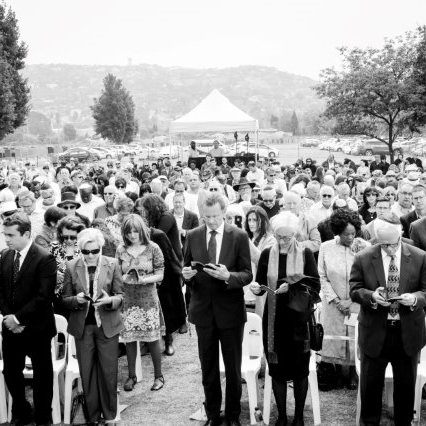
News

Krausz bears witness at West Park Cemetery
ROBYN SASSEN
With Don Krausz, a survivor born in Holland of Hungarian and English roots, telling his harrowing tale of survival and luck, horror and privations, and losses too great to bear that simply had to be borne, the event’s capacity audience was rapt.
“As a Holocaust survivor I have an obligation not to forget and to bear witness,” he concluded his detailed and candid testimony, which took him from Rotterdam as a seven-year -old, to Westerbork and Ravensbruck and finally on the death march. Krausz’s childhood was broken by the horror he had to make sense of.
“My obligation is to testify to what I experienced and to remember it. My conclusion was, not that the people who had murdered us were monsters but that they had been indoctrinated to the point where they believed that we, Jews, were not human.
“If you find a poisonous snake in your house, what do you do? You look to kill it. You don’t ask if it’s a mommy snake. Or a baby. And that was the attitude of the anti-Semites where Jews were concerned. My message is: Don’t dehumanise people.”
ANC MP Thandile Sunduza was visibly moved by the whole ceremony. “The Jewish community is not doing enough to educate the broader community about the horrors of the Holocaust,” she felt. “They must go into communities: [the children] are learning about the (Second) World War, but they don’t know what really happened to the Jews.”
Another thread through the programme was community. Shaun Zagnoev, the Gauteng Council’s chairman, reflected that of all the days in the Jewish calendar, Yom Hashoah is the most communal.
Rabbi Yossy Goldman told of the plight and challenges his father, the late Reb Shimon Goldman z”l, faced in escaping the Holocaust to find sanction. “I speak to you not as a rabbi,” he began, “but as the son of a survivor. My father was not in a concentration camp, but he was the sole survivor of his entire, large family in Poland; a distinguished family that could trace its lineage back to Rashi.”
At 14, Shimon was not rebellious, but he elected to run away from home. That saved his life. He received a transit visa in Vilna through Japanese diplomat Chiune Sugihara, who was responsible for saving some 6 000 Jews, and travelled through Moscow to Japan, then Shanghai and finally New York, after the war ended.
“My father was never certain whether his family’s last days were spent in Majdanek or Treblinka. There were no graves. No tombstones. Every year, he would observe one day of yartzheit. 12 Elul, for his entire family.
Rabbi Goldman described the community’s responsibility – not only to remember the Holocaust’s atrocities, but to rebuild. “If it was our destiny to go through the death camps of Auschwitz and Ravensbruck, it was not our destiny to die. Our Divine destiny is not only to survive, but to live and to flourish as Jews, raising generations of proud, committed, knowledgeable, practising Jews. My father’s proudest achievement was the family that he rebuilt.”
Deputy Ambassador to Israel Ayellet Black, spoke about the next generation’s imperative to see “the baton of Holocaust memory” change hands. Featuring candle-lighting by Holocaust survivors, the communal singing of the Partisan song and a tribute to fallen Jewish soldiers by Bill Bergman of the SA Jewish Ex-Servicemen’s League, the ceremony was concluded with a Hazkarah by Levi Singer.




